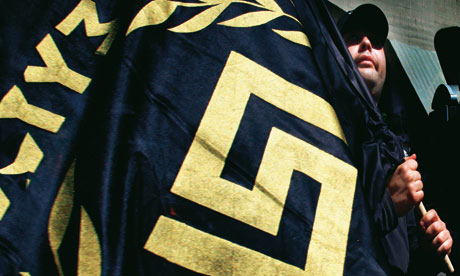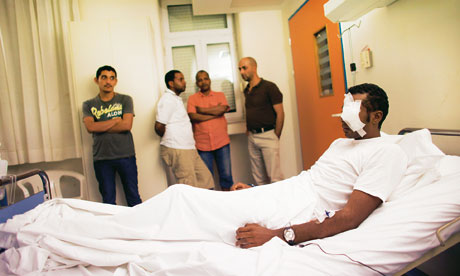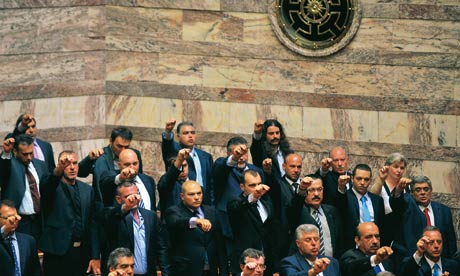In austerity-ravaged Greece, neo-Nazi party Golden Dawn is on the rise. Their MPs give fascist salutes, while on the streets black-shirted vigilantes beat up immigrants. And some of their most enthusiastic supporters are in the police


The flag of Golden Dawn: ‘ We want all illegal foreigners out of our country, we want the usurers of the troika and the IMF out for ever.’ Photograph: Reuters
You can hear it from blocks away: the deafening beat of Pogrom, Golden Dawn's favourite band, blasting out of huge speakers by a makeshift stage. "Rock for the fatherland, this is our music, we don't want parasites and foreigners on our land…"
It's a warm October evening and children on bicycles are riding up and down among the young men with crew cuts, the sleeves of their black T-shirts tight over pumped-up biceps, strolling with the stiff swagger of the muscle-bound. They look relaxed, off-duty. Two of them slap a handshake: "Hey, fascist! How's it going?"
Trestle tables are stacked with Golden Dawn merchandise: black T-shirts bearing the party's name in Greek, Chrysi Avgi, the sigma shaped like the S on SS armbands; mugs with the party symbol, a Greek meander drawn to resemble a swastika; Greek flags and black lanyards, lighters and baseball caps. I lean over to talk to one woman stallholder, dressed in Golden Dawn black with thickly kohl-rimmed eyes, but as soon as she opens her mouth a man in a suit strides up: "What are you writing? Are you a journalist? Tear that page out of your notebook. No, no, you can't talk to anyone."
Tonight is the opening of the Golden Dawn office in Megara, a once prosperous farming town between Athens and Corinth. The Greek national socialist party polled more than 15% here – double the national average – in the June election, when it won 18 seats in parliament. (One was taken up by the former bassist with Pogrom, whose hits include Auschwitz and Speak Greek Or Die.)
Legitimised by democracy and by the media, Golden Dawn is opening branches in towns all over Greece and regularly coming third in national opinion polls. Its black-shirted vigilantes have been beating up immigrants for more than three years, unmolested by the police; lately they've taken to attacking Greeks they suspect of being gay or on the left. MPs participate proudly in the violence. In September, three of them led gangs of black-shirted heavies through street fairs in the towns of Rafina and Messolonghi, smashing up immigrant traders' stalls with Greek flags on thick poles.
Such attacks are almost never prosecuted or punished. Ask Kayu Ligopora, of the Athens Tanzanian Community Association, whose premises were vandalised by around 80 "local residents" on 25 September after police walked away. He's lived in Greece for 20 years; for the first time, he says, he's thinking about leaving. Or Hussain Ahulam, 22, who told me how four men with dogs and a metal crowbar left him bleeding and unconscious by the side of the road as he walked home one day. Or 21-year-old HH, a Greek citizen of Egyptian origin, who was beaten on 12 October by three men with chains as he stepped off the trolley bus, and whose sight may be damaged for good.
Or ask @manolis, a blogger for Lifo magazine, who on 11 October went to photograph Golden Dawn's attack on a theatre showing Terrence McNally's Corpus Christi, which casts Christ and the apostles as gay men in Texas. He says four or five people surrounded him in front of the riot police, hit him and spat on him, and put a lit cigarette in his pocket. "A known Golden Dawn MP follows me, punches me twice in the face, knocks me down," he tweeted. "I lose my glasses. The MP kicks me. The police are exactly two steps away." Another MP, Ilias Panagiotaros, stood on the sidelines ranting in front of video cameras: "Wrap it up, you little faggots. Wrap it up, arse-fuckers. You little whores, your time has come. You fucked Albanian arseholes." A third, Christos Pappas, was filmed releasing a man from police custody. He is the only one now under police investigation.
 HH, a Greek of Egyptian origin, was beaten by three men with chains. Photograph: Eirini Vourloumis for the Guardian
HH, a Greek of Egyptian origin, was beaten by three men with chains. Photograph: Eirini Vourloumis for the Guardian
In Megara, as the light fades, people are gathering: families, children, grandmothers. A woman in a long green dress and high-heeled silver mules is choosing a black T-shirt; another asks the price of a Greek flag. Suddenly there's shouting, a thunder of boots on asphalt: 50 yards from the stage, a group of braves have pushed a man off a red motorbike and are kicking and punching him as he lies on the ground. His arms are protecting his head; I can hear the boots go in. No one stirs until an older member calls them off: "Come back to our space, fellow fighters. The Leader is on his way." The Leader, Nikolaos Michaloliakos, squat in a baggy suit, threads his way through the crowd accompanied by the party's spokesman, Ilias Kasidiaris, a former commando with five criminal charges pending, famous abroad for assaulting two women candidates on TV in June. On talkshows, Kasidiaris scowls and slouches like a delinquent teenager, but tonight he looks expansive, almost rock star cool. The office door is flanked by men in camouflage trousers, with crash helmets and Greek flags rolled around wooden staves; more stand guard on the balcony and the roof.
Standing among the citizens of Megara as Michaloliakos addresses them, I feel as if I've slipped into a parallel universe. As a Greek, I've known these people all my life: middle-aged women with coiffed hair and well-upholstered bosoms, men in clean white shirts and neatly belted trousers. They're the people who run the cafes and corner shops; who work hard every day, often at two or three jobs; who pinch children's cheeks and won't let you pay for your coffee; who were always cynical about politicians' promises. I never thought they could fall prey to fascist oratory. Yet here they are, applauding Michaloliakos as he barks and roars, floodlit against a low white building next to the petrol station. We could almost be back in the 1940s, between the Axis occupation and thecivil war, when former collaborators whipped up hatred of the left resistance.
Michaloliakos has his populism down pat. His message is pride, and purity, and power. He lambasts the other parties for selling out the country, for their lies and corruption, with special attention to the left party, Syriza. Golden Dawn, he says, are the only patriots, the only ones who haven't dipped their hands in the honeypot. He praises Megara, which used to supply all of Greece, "before we started eating Egyptian potatoes, Indian onions and Chilean apples". Then he turns to "the two million illegal immigrants who are the scourge of this country", who sell heroin and weapons with impunity. "Voting for us is not enough," he says. "We want you to join the struggle for Greece. Don't rent your house to foreigners, don't employ them… We want all illegal foreigners out of our country, we want the usurers of the troika and the IMF out of our country for ever."
After the fireworks and the flares and the national anthem, Efthimia Pipili, 67, gives me her reaction. "Foreigners have come twice to my house to rob me in the night," she says. "If I didn't have my rottweiler, I'd be dead by now. I used to vote for Pasok [the Panhellenic Socialist Movement]. Last time I voted for Tsipras [the leader of Syriza] because I thought he was different. But Tsipras wants to protect the foreigners. I have €100 to last for the next three weeks. I owe €400 to the electricity company; they're going to cut me off. Why shouldn't I be for Golden Dawn, my love?"
Golden Dawn is many things: a party, a movement, a subculture; a vigilante force; a network inside the police and the judiciary. Vasilis Mastrogiannis of the Democratic Left, a former senior police officer turned politician, describes it frankly as "a criminal organisation". New Democracy MP Dimitrios Kyriazidis, who founded the Greek police union, calls it a "political excrescence". "Because of my past in the police, I know very well where these people come from," Kyriazidis says. "Most declare their profession as 'businessman'. But one has to pause at that."
The party's founder and leader, Nikolaos Michaloliakos, served time in the late 1970s for assault and illegal possession of guns and explosives. While inside, he met members of the military junta that ruled Greece from 1967 to 1974, but his political views, as expressed in Golden Dawn, the magazine he started when he was released, were well to the right of theirs. Breaking the boundaries of "acceptable" rightwing nationalism, Michaloliakos published paeans to Adolf Hitler, arguing that Greece should have been at the side of the Axis in the second world war. The magazine, its covers periodically adorned with portraits of the Führer and his acolytes, served up a weird amalgam of Nazi propaganda, antisemitism, traditional nationalism and pagan fantasy. The party that now courts and counts on the Orthodox church once advocated a return to "the faith of the Aryans" – the Olympian gods – claiming that Christianity had "grafted Jewish obscurantism on to the trunk of European civilisation". In the one interview I was allowed with a Golden Dawn official, MP Panagiotis Iliopoulos told me that, as a young man, the magazine expressed his ideas completely. Have the party's views changed since then? "Not at all," he said. "There are no neo-Nazi articles in the magazine. Only historical ones."
Golden Dawn first drew attention in the early 1990s, when the dispute over the name of the Former Yugoslav Republic of Macedonia fuelled an upsurge of Greek nationalism. It found fertile ground in the anti-immigrant sentiment that spread through Greece with the first wave of migrants from Albania and eastern Europe; it gathered strength as the failures of Greek and European policy turned Greece into a lobster trap for refugees and migrants coming from Asia, Africa and the Middle East. As thousands struggled to survive beside impoverished Greeks in neighbourhoods shattered by the economic crisis, Golden Dawn vigilantes began to "clear" Athenian squares with fists and clubs and knives; to storm unofficial mosques; to sell protection to shopkeepers; to escort old ladies to the supermarket. In 2009 the party polled a mere 0.29% in the national election. In 2010, Michaloliakos was elected to the Athens city council; he celebrated his arrival with a fascist salute.
 Golden Dawn MPs. Photograph: AFP/Getty Images
Golden Dawn MPs. Photograph: AFP/Getty Images
As the crisis deepens – 25% unemployment, and 54% among the young; a third of the businesses in central Athens closed; savings gone and faith in the two old mainstream parties lost; violent scenes erupting even in parliament – there is a smell of fear in Athens, as well as one of numb depression. In June, many voted for Golden Dawn as a protest against the parties that brought the country down: "I want them in parliament to beat the others up." Now they are turning to it because hope is exhausted; because things are out of control and they want someone to take charge; because it's "doing something". "It's not that Greece is going to be saved," one voter said to me. "Greece can't be saved." What, then?
The Golden Dawn office in downtown Athens is open three evenings a week. Most of the visitors are middle-aged women with dull eyes and sunken cheeks, faces too old for their bodies, hardened, tired expressions. More than 50 come in an hour. Quietly, they ask the bouncers, "Are they giving out food inside?" "Third floor," the bouncers say; but most of the women come out empty-handed save for a mauve piece of paper with the Golden Dawn logo on it. There's only enough today for voters from this ward; they'll announce the next distribution on a poster, in the papers, if you phone.
Away from the door, Maria Kirimi tells me she's been locked out of her flat with all her things inside since 29 July; the family are crowded at her mother's now, seven people surviving on €400 a month. "We're the living dead," she says. Isn't she troubled by Golden Dawn's violence? "The boys in the black shirts are the only ones I'm not scared of. I feel they'll protect me." I ask her mother, old enough to remember the junta, what she thinks of their far-right views. "I heard Michaloliakos say on TV that their sign isn't Hitler's sign but a patriotic one," she says, and then looks down at her feet. "It does upset me a bit. But I haven't heard of anyone else giving out food."
For the young people drawn into its inner circle, Golden Dawn means much more. Vetta has Celtic crosses on her collar points, a pack of Stuyvesants and a can of Red Bull clutched in her left hand. Her kohl-rimmed eyes dart back and forth as she speaks, but she is open, friendly. The 33-year-old says she helped to "clear" Aghios Panteleimon square three years ago and was stunned by people's gratitude. She's a member now, one of 20 chosen each year for their contribution to the cause and given lessons in ideology and behaviour: "We have to welcome everybody, to be polite but serious." There's a dress code for women – no heels, low-cut tops or bare backs – and a growing Women's Front, which offers training in self-defence. "But there's no difference between men and women here. We all sweep and mop. And, yes, the men make coffee."
The Golden Dawn office in industrial Aspropyrgos is in a flat above an empty garage, next to the old elevated motorway. The stairs are lined with crash helmets, black shields and Greek flags rolled on to wooden staves, ready to snatch up at a moment's notice. The walls are hung with the slogans of Greek nationalism – "Macedonia is Greek soil" – and a blown-up photograph of Golden Dawn supporters fighting the riot police. Arete Demestika – six months pregnant, ponytail down to her waist, earrings like black roses – waxes lyrical in praise of the party: "It's an attitude, a way of life, it's what's called Greece. It awakens new parts of you and makes you stronger, it arms you with knowledge, it's a secret school. We learn our true history, the lore of the nation, because the Greeks are a superior race. And it's given me my family – I met my husband here – and made me feel I'm not alone in the struggle for our country."
But outside, as the sun goes down, 27-year-old Costas, a black-booted Golden Dawn cadre, slips out from under the rhetoric and speaks in his own words. He's an inspector now in the Eleusis oil refineries, but that's not his vocation. He's a craftsman, a marble carver; he used to work atthe Acropolis, but the pay was terrible and you couldn't get a decent contract if you weren't in the right party. His face softens and sweetens as he talks about working the marble, learning the craft as a boy, and I realise that he comes from a village I know well. Suddenly we're two people – two Greeks – talking about a place we love, a place full of memories, almost as if things were normal.
Deliberately, inexorably, Golden Dawn is moving into the gaps left open by the crippled Greek state. Its strategy is a blend of seduction and extortion, the exploitation of need backed by the threat of violence. To its existing "solidarity projects" – "Food for Greeks only" and "Blood for Greeks only" – the party has now added a third: "Jobs for Greeks only". Golden Dawn members are visiting workshops and factories, counting and publicising the number of foreign workers there, "encouraging" employers to hire Greeks instead. But its biggest success has been the provision of "security", with the collusion of the authorities: the intimidation of migrants, protection of Greek shops, vigilante patrols.
Adept at spectacle, the party claims new territory with a show of black-shirted strength, fireworks and flares and fanfare, masculine energy. Physical fitness is a big part of its culture. There are Golden Dawn gyms that don't admit foreigners; Golden Dawn security firms. MP Panagiotaros owns a shop called Phalanga that sells military memorabilia; bovver boots and black gloves; ultra football shirts; kit by Pit Bull and Hooligan. Members of the military junta beam from photos on the wall. The heavy stuff is said to be kept in a back room.
 Yianna Kourtovik acts for victims of racial attacks. Photograph: Eirini Vourloumis for the Guardian
Yianna Kourtovik acts for victims of racial attacks. Photograph: Eirini Vourloumis for the Guardian
As middle-class Greeks have fled the centre of Athens, immigrants have moved into their empty properties. It's common knowledge that if you want to get squatters out of your flat, you call Golden Dawn, not the police, who at best will quietly pass you a Golden Dawn telephone number. The story has become a staple of dinner-party conversation; in the version I heard from unemployed journalist Julia Iliakopoulou, the Golden Dawn heavies who cleared the Pakistanis out of her friend's flat by "beating them black and blue" made them clean it up and paint it afterwards. "Don't upset yourself," they said. "We're Greeks helping Greeks."
It's hard to measure just how deeply Golden Dawn has penetrated the police. In Athens wards where the police vote in large numbers, the party polled 19-24% last summer; Panagiotaros crows that 50-60% of the force is now with the movement. What's obvious is that rightwing violence almost always goes unchecked, even when it happens under officers' noses or on camera. Early in October, anti-fascist protesters told me they had been tortured in the Athens police headquarters: burned with a cigarette lighter; forced to strip naked, bend over and spread their buttocks; filmed by officers who said they'd give the pictures to Golden Dawn. As I tried to interview some of them in a public lobby of the Athens courthouse, an officer grabbed me by the arm and pulled me roughly away. A police spokesperson denied the protesters' allegations.
Lawyer Yianna Kourtovik is familiar with Athens' most notorious police station, Aghios Panteleimon, which in 2010 was censured by a United Nations special rapporteur. She tells me that migrants trying to bring complaints of racist violence are routinely threatened with counter-charges and held in the cells; that local supporters of Golden Dawn wander freely in and out of rooms where complainants are giving statements; that she has had to prevent a friend of accused attackers from removing evidence. "If that isn't giving cover to Golden Dawn, I don't know what is," she says. A few weeks ago, she was egged by Golden Dawn outside the station while the police looked on. Then: "The other day, as I was walking down the road, two uniformed officers behind me started chanting, just loud enough for me to hear, 'Blood! Honour! Golden Dawn!'"
Why are such allegations never investigated? The usual response from those on the left is that Golden Dawn is "the long arm of the state" – that the government tolerates it to discourage immigration and keep people in a passive state of terror. But Golden Dawn is now much more of a threat to public order than protesters against austerity. There is also the fear of further alienating a desperately underfunded, underpaid and demoralised police force. New Democracy's Kyriazidis has led efforts to isolate Golden Dawn in parliament and, as a veteran union organiser, has intimate knowledge of the old militarised, post-junta police. But when I put the question to him, he hesitates: "Now that Golden Dawn is a legal party in parliament, we can't do anything… If there is an investigation, it has to be done internally, to remove individuals who act in this way but not weaken the police as a whole."
Through some lethal cocktail of intention, incompetence and inertia, the state has let a violent, anti-democratic force take control of law enforcement.
Greece has bitter experience of what can happen when the far rightinfiltrates the security services. But the Democratic Left's Mastrogiannis thinks what is happening now is more dangerous than a coup. "With the junta, you knew the enemy," he says. "But these people are acting inside society, undermining the system from within. People doubt that democracy is alive. They see it as something that works only for the few, who exploit it to make money. And the circumstances are not transient. This situation could go on for 15, 20 years."
Already Golden Dawn's success has moved the agenda to the right. Speaking in Paris last month, prime minister Antonis Samaras compared his country to 1930s Weimar. Trying to win back ground before the last election, he launched an ill-thought-out campaign (Xenios Zeus, or Zeus the Host) to round up illegal migrants, and spoke of taking back Greece's city centres. "I try to tell myself that he meant from criminals," says Dr Yunus Mohammadi of the Greek Forum of Refugees, "but really he meant from migrants."
People quickly become inured to hate speech and violence. Panagiotaros now speaks openly of a "new kind of civil war" between Greeks and "invaders", nationalists and leftists. Two years ago, a friend who sits on the Athens city council came in late to find only one empty seat, beside Michaloliakos. He hesitated, but the Golden Dawn leader waved him over. "Do sit down," he said. "Fascism isn't contagious." At the time, we thought it funny.
Δεν υπάρχουν σχόλια:
Δημοσίευση σχολίου